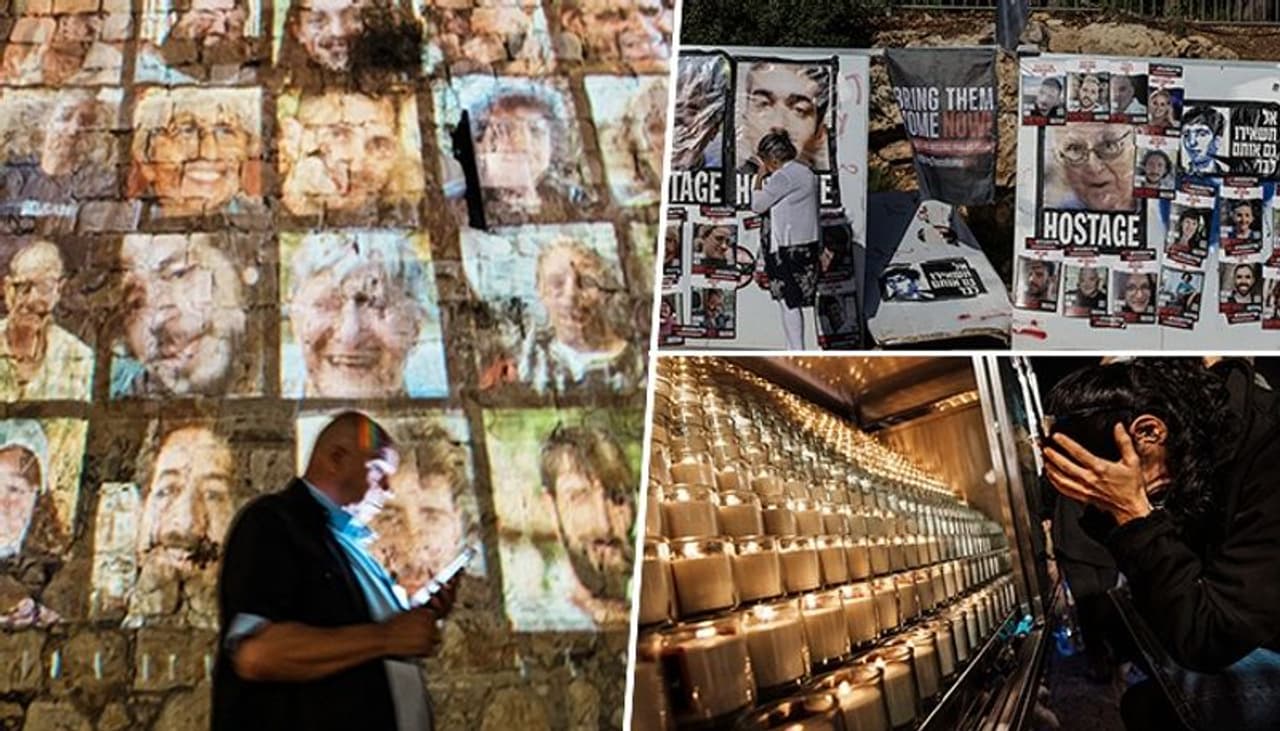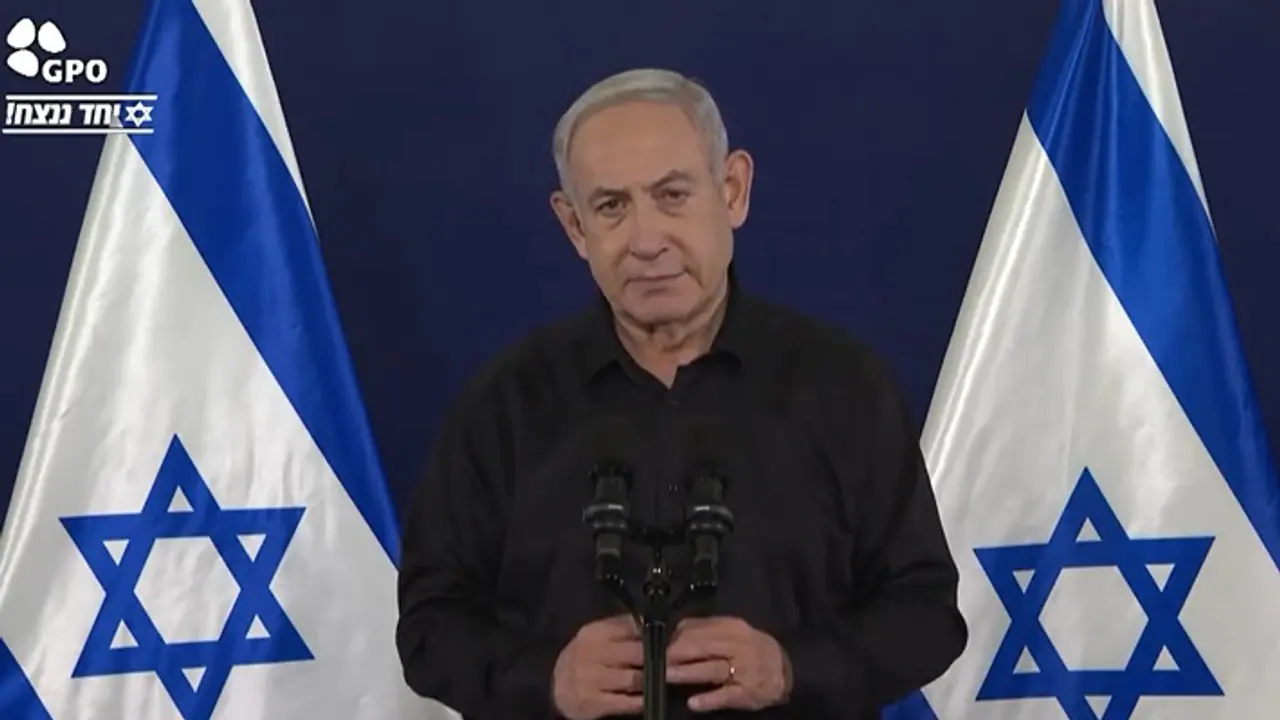According to a report in The Guardian, Israel PM Benjamin Netanyahu rejected a deal for a five-day ceasefire with Palestinian terrorist groups in Gaza in return for the release of some of the hostages held in the territory.
Israel PM Benjamin Netanyahu reportedly turned down an offer from Palestinian terrorist groups in Gaza for a five-day ceasefire in exchange for the release of some of the hostages held in Gaza, according to a report in The Guardian. The report, quoting sources familiar with the negotiations, stated that following Hamas terrorists' barbaric attacks on Israel on October 7, which resulted in an estimated 1,400 Israeli deaths, the Netanyahu categorically rejected the agreement during the early stages of negotiations.

Following the start of the Israeli ground offensive on October 27, negotiations were believed to have restarted. However, according to The Guardian report, quoting the same sources, Netanyahu has stuck to his guns when it comes to proposals that call for variable lengths of ceasefire in exchange for different numbers of hostages.
The report claimed that much more hostages were involved in negotiations that took place before the ground invasion into Gaza, with Hamas suggesting the release of dozens of foreign nationals who were being held captive.
By Thursday night, the Israeli prime minister's office had not responded to requests made by the publication for comment regarding the hostage negotiations.
After operatives from Hamas, Palestinian Islamic Jihad, and other Gaza-based terrorist organisations penetrated the reinforced border fence dividing the area from Israeli communities and kibbutzim, an estimated 240 persons were taken captive.
Families of those held in Gaza staged a demonstration outside of Netanyahu's home earlier this week, demonstrating the growing public outrage and demands that Israel give hostage talks first priority.
The original agreement on the table, according to three people familiar with the negotiations as quoted in the report, called for the release of the hostages' women, children, elderly, and sick in exchange for a five-day ceasefire. However, the Israeli government reportedly rejected this and made it clear by starting the ground offensive.

More than 25,000 people have been injured and over 10,300 people have been killed in the last month as a result of Israeli airstrikes and an ongoing ground invasion of the 2.3 million-person northern Gaza Strip, according to the Hamas-run health ministry in Gaza. Izz ad-Din al-Qassam, the militant arm of Hamas, has a spokesperson named Abu Obeida who claims that the group is unable to free more hostages due to the increasing number of strikes.
As the two sides do not formally communicate, indirect talks between Israeli and Hamas representatives, mediated by Qatar, are currently reported to be centred on the prospect of a one- to three-day cease-fire linked to the release of ten to fifteen captives.
The attempt to exchange the few captives and halt hostilities temporarily, according to the report, served as a litmus test and a springboard for additional hostage negotiations.
The agreement now on the table would also allow more help, including modest amounts of gasoline, to enter Gaza after Israel largely curtailed supplies of food, water, aid, and fuel days after Hamas's incursion, according to officials from Egypt, the UN, and a western diplomat who spoke with Associated Press. The Biden administration proposed tying the duration of the truce to the number of captives up for release, US sources told AP.
On October 20 and 24, four women—two of whom were American citizens and the other two were Israelis—were released as a consequence of negotiations to liberate the hostages. Egyptian negotiators were reportedly close to negotiating an agreement that would result in a hostage swap and a "humanitarian truce" in Gaza, according to the Egyptian cable news programme Al Qahera.
A key topic of discussion, according to one person with knowledge of the negotiations to release the hostages as reported by The Guardian—which stalled following Israel's ground invasion of Gaza—was Israel's insistence that Hamas furnish a comprehensive list detailing the identity and particulars of every individual detained in Gaza. This list reportedly became the main topic of talks because the Israeli side would not stop bombarding without it.
In response, Hamas reportedly said that because the estimated 240 hostages were being held by various organisations in various locations around Gaza, it was not possible for it to disclose the list without a lull in hostilities. That implied that even the leaders of Hamas are unsure of the precise number of Palestinians kept captive, where they are, or how many have managed to escape the bombardments that have decimated Gaza for more than a month.
According to a another source, quoted by the publication, Hamas had originally sought fuel, other supplies, and prisoner exchanges in exchange for the hostages, but these demands had been withdrawn in favour of just stopping the airstrikes.
“Each time the Israeli counter-demand got harder,” the source told The Guardian.
Hamas members have alleged in the past that they kidnapped hostages in order to trade them for the thousands of Palestinian detainees kept in Israeli prisons.
Splits within the Israeli establishment have also reportedly surfaced as a result of the negotiations, with right-wing government officials, military hawks, and Netanyahu in particular facing off against the Mossad intelligence agency, which is leading the hostage negotiations, as well as some generals.
“Each time a deal would go back to Bibi [Netanyahu] it would come back with tougher demands,” another source told the publication.
Netanyahu has made it clear that he opposes any notion of a ceasefire and that he will instead step up his operations on Gaza, reminding the Israeli people that destroying Hamas is essential to finding long-term answers to the security lapses that allowed for the attack on October 7.
David Meidan, a former Mossad agent who oversaw the Israeli soldier Gilad Shalit's release from Gaza more than ten years ago, stated to Haaretz in mid-October that, "There’s no doubt that the first issue the state has to deal with is the matter of the captives. The most vulnerable among them. Children, the elderly, mothers and the wounded. The window of opportunity for this is very narrow. We have to finish this within a short time, within a week."
Discussions have reportedly centred on trying to locate individuals in the Israeli camp who are open to the idea that more hostage releases would not be feasible in the event of a combat flare-up, particularly since this would put the hostages, who are dispersed around Gaza, at further risk.
“The war is moving forward with force that Hamas has never seen,” Netanyahu declared in a forceful speech marking a month since the incursion. “Gaza City is surrounded. We are operating within it, we are deepening the pressure on Hamas every hour, every day.” He added: “There will not be a ceasefire without the return of our kidnapped.”
According to Israeli media, Yossi Cohen, the previous director of Mossad, and David Barnea, the current director, recently travelled to Doha to talk about hostage negotiations. Their presence, together with the Mossad's expanded involvement in the talks, seemed to turn the conversation towards the prospect of a restricted hostage release linked to a short-term ceasefire.
Earlier this week, Egyptian President Abdel Fatah al-Sisi met with CIA Chief William Burns in Cairo. According to a statement, al-Sisi "underlined the necessity of an immediate ceasefire [in Gaza] to protect civilians and facilitate access to humanitarian aid."
Burns reportedly met on Thursday in Doha with the prime minister of Qatar and Mossad chief Barnea to discuss a possible agreement to release captives in exchange for a ceasefire.
At the start of this week, US President Joe Biden informed reporters that he had asked Netanyahu to "pause" attacks on Gaza. According to Axios, Biden's support for the "three-day pause"—which he discussed over the phone with Netanyahu on Monday—was connected to the release of a few hostages.
